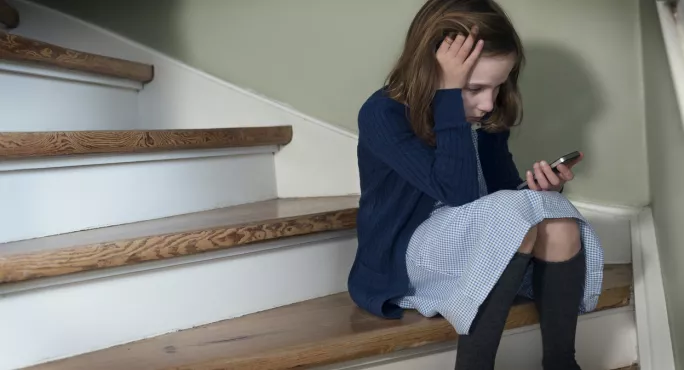- Home
- ‘My daughter believed she was witnessing a suicide’
‘My daughter believed she was witnessing a suicide’

My husband and I are pretty relaxed sort of parents. While values such as kindness and courtesy are non-negotiables, our children have plenty of autonomy over how they use their free time, the state of their bedrooms and their choice of friends.
My daughter - let’s call her Ellie (not her real name - this article is anonymous for obvious reasons) - has quite recently turned 12. Underneath the turmoil of early adolescence is a strong, thoughtful and sensitive girl - the kind of girl others turn to when they’re in trouble. We’re very proud of her.
I want to write about a night two weeks ago. Of course, in Ellie’s world, this is now ancient history, and attentions have been turned to the latest sleepovers, trainers and football injuries So, it’s two weeks ago. I’m driving back from a work event in the rain, and my phone keeps pinging. Realising it’s her, I stifle irritation (since when was anyone silly enough to buy a 12-year-old a phone?).
“When are you home, Mummy?”
“Mummy!”
“Muuuum. When are you home?”
I can only assume she’s holding me to the exact time I said I’d be back, is waiting for the snacks I’d promised I’d bring, or needs help with her maths homework.
Puffy-faced distress
But I arrive home to an unusually grave-looking husband and an unusually puffy-faced, distressed daughter, holding her phone.
There are more than 40 texts on her phone from a friend, which she has been responding to over the past hour, alone in her room. Her friend describes in detail (with photographs) her live attempt to take her own life.
“Stop. Please don’t.” writes my daughter. “Please! Stop it!” as her friend shares details of apparently intensifying physical symptoms: “It hurts now. I’m losing feeling.”
As adults, after detailed action-planning and arranging next morning contact with the school, it was possible to find the black humour a little later in the contemplation of how the texting fingers kept working despite everything else.
But, from our daughter’s point of view, her friend was going to die at her own hand. Ellie was the only one who knew about it, was entirely helpless to stop it, and thought that telling an adult would make everything worse, resulting in inevitable ostracism.
And you know what? This is the second time this has happened. Just weeks previously, another child with a detailed plan to end her life left messages, including dates, times, methods. Our daughter was sworn to secrecy on the understanding that, if she “snaked” (told an adult), her friend would take her life even sooner.
Huge burdens
On both occasions, our daughter did the right thing. So did the school, who, it would seem, are dealing with such incidents daily. We are very proud of Ellie, but this matters less to her than the fact that her friends did indeed subtly (in a way no teacher would notice) exclude her from private conversations for days (and days are long when you’re 12) afterwards.
The girls in questions are both dealing with huge burdens of their own and, with stretched resources, families and school are doing their best to support them. In the meantime, my tiger-mother self is waiting for the next time my daughter genuinely believes she is about to be witness to - or indeed indirectly responsible for - a death. I am terrified about the impact on her and the normalisation of such incidents.
You see, the reality is that most of her friends are currently self-harming in some form or another. It would appear (from a non-scientific perspective) that my daughter is in the minority, and I fear it won’t stay that way.
I fear for the school, which can only be firefighting, the various organisations who want to offer support but whose resources are stretched to breaking, and the families who - just like the rest of us - are doing their very best to be good enough parents, in the knowledge that their children are suffering and can sometimes only envisage one way out.
I’d love to move on to practical solutions and top tips at this point, but I’m lost on this one. All my energy is going into a fairly unfamiliar form of fierce protectiveness: ensuring my daughter keeps talking, keeps a sense of humour, and maintains a sense of perspective and an understanding that she can’t solve the world’s problems on her own - in the absolute knowledge that she won’t stop trying.
The author is a teacher in an inner-city secondary school
Keep reading for just £1 per month
You've reached your limit of free articles this month. Subscribe for £1 per month for three months and get:
- Unlimited access to all Tes magazine content
- Exclusive subscriber-only stories
- Award-winning email newsletters



